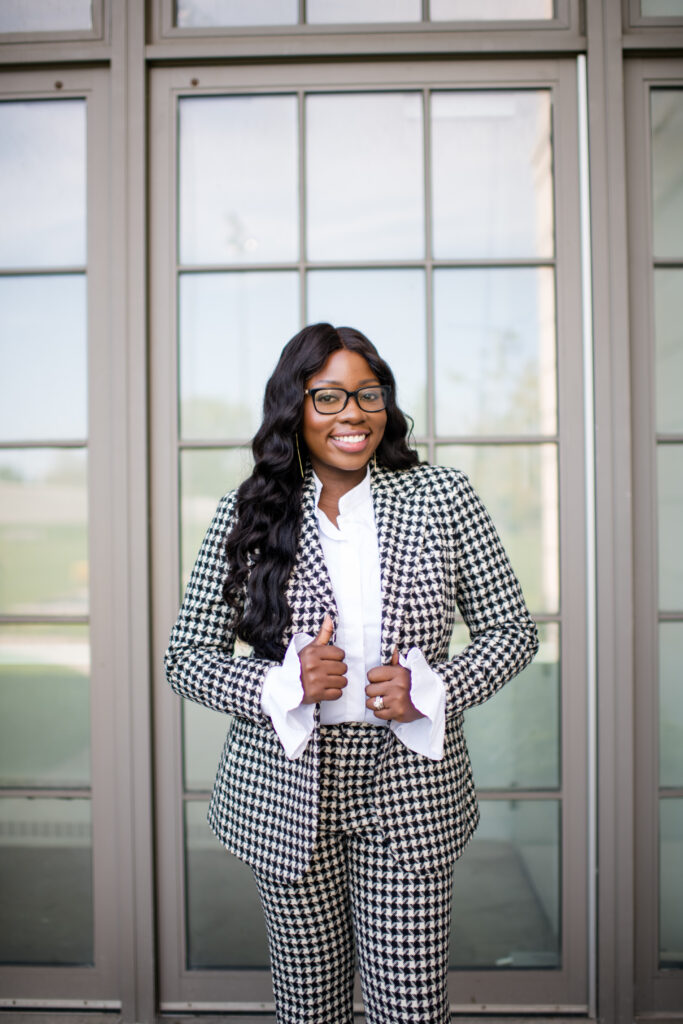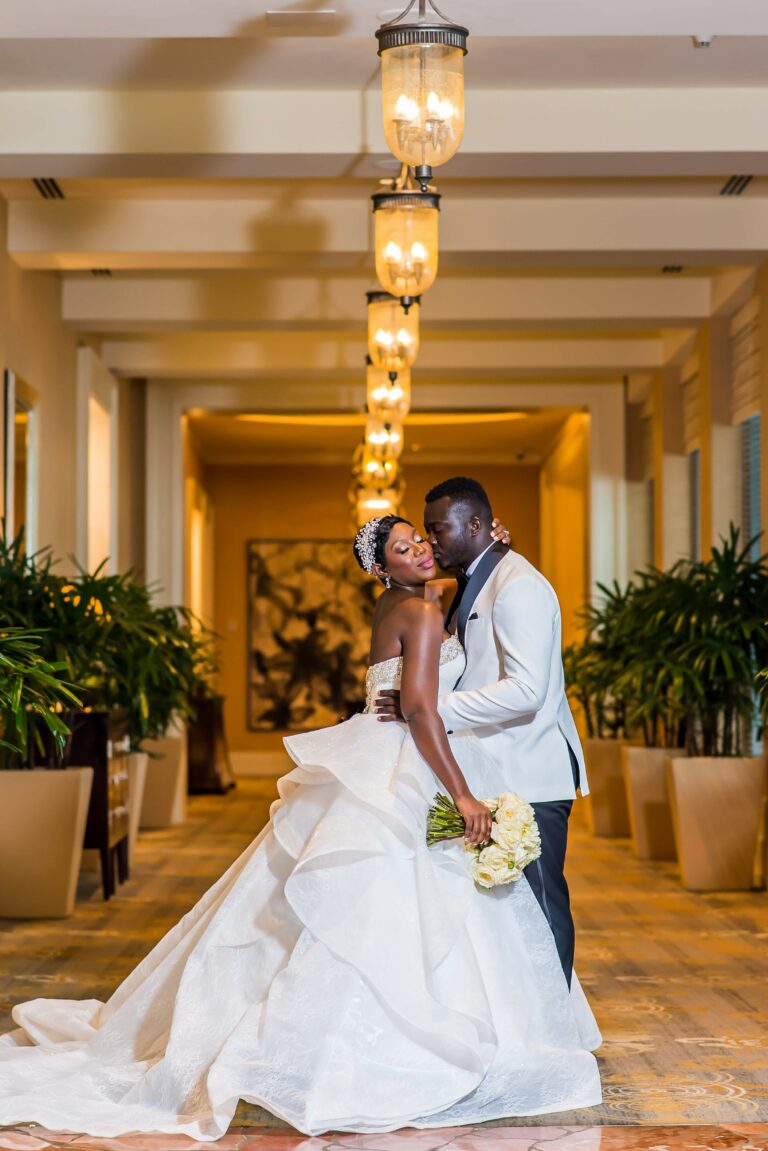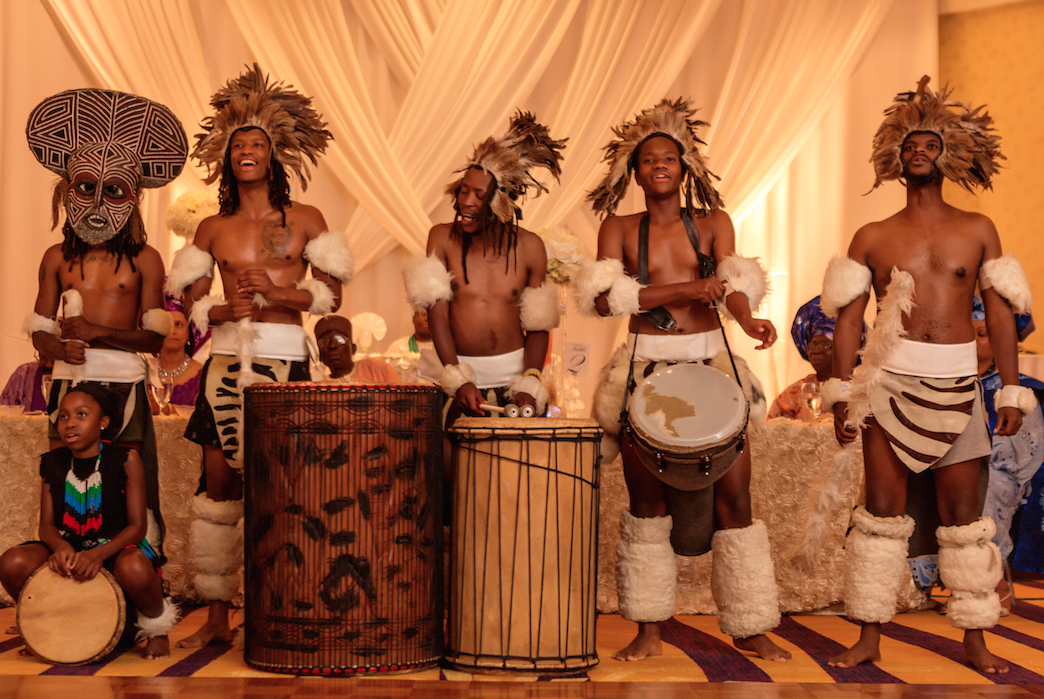
Nigerian Igbo Engagement Ceremonies (also known as the Traditional Wedding and an “Igba Nkwu” ceremony) is a colorful celebration of love, culture, and community. Steeped in rich traditions that have been passed down through generations, these weddings are a sight to behold.
In this ultimate guide to Nigerian wedding traditions, we’ll explore the ceremony, attire, key roles, and key components that make Nigerian Igbo Engagement Ceremonies truly special.
Whether you’re a bride or groom-to-be, a guest attending an upcoming wedding, or simply curious about the customs, we’ve seen it all in our 10 years planning and executing Nigerian and multicultural weddings in the United States, and we’ve got you covered in this article!
Order of Events For a Traditional Igbo Engagement Ceremony
The Traditional Igbo Engagement Ceremony, also known as “Igba Nkwu” includes various customs and rituals that are moderated by 1 male MC.
Below is the typical order of events for an Igbo wedding. Every family has slight nuances in their personal customs and traditions for their family so it’s always important to check in with parents for their approval.
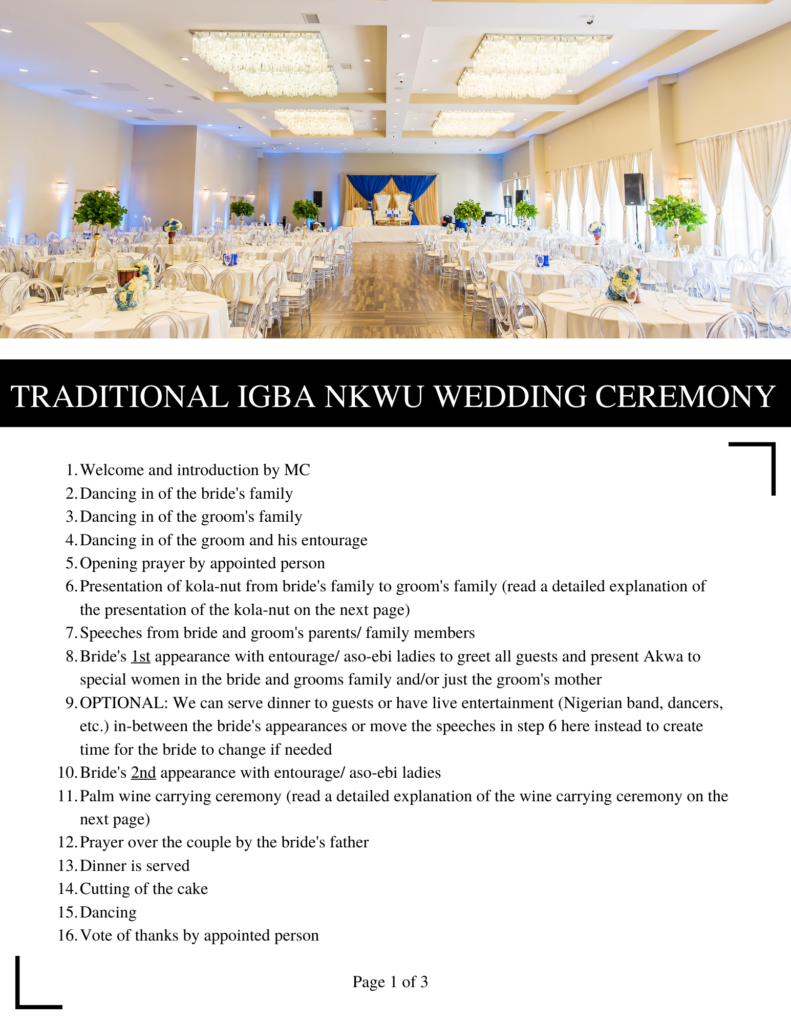
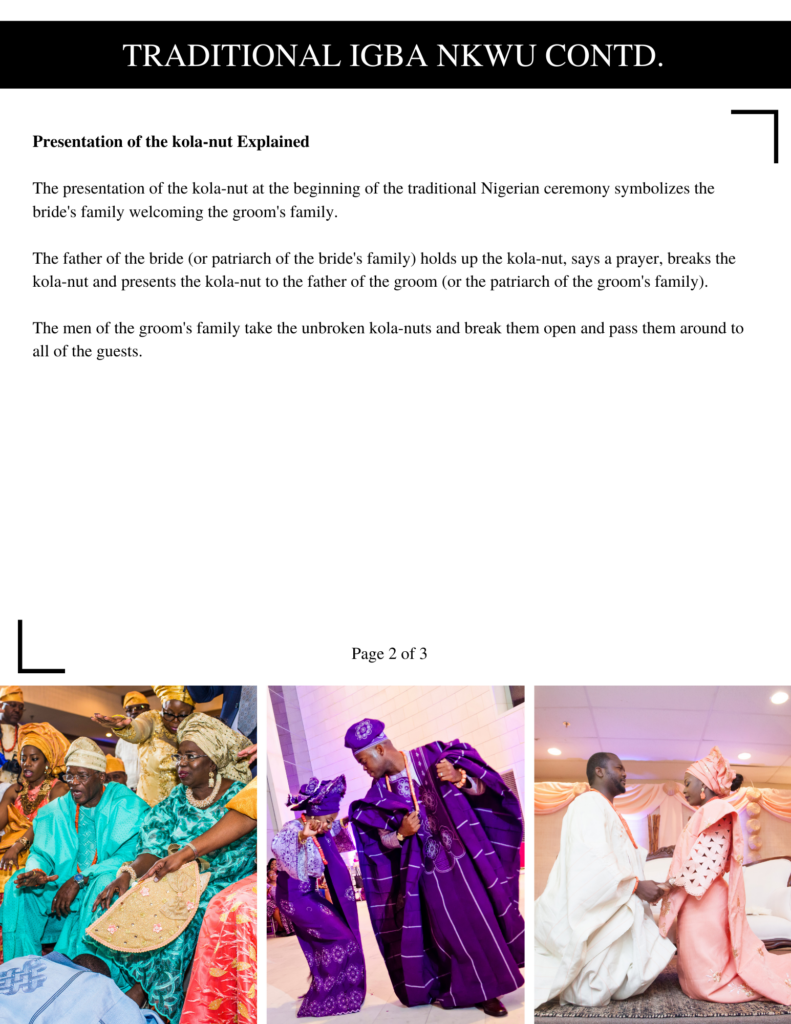
For weddings where both of the celebrants are Nigerian but have different subcultures for example, the bride is Igbo but the groom is Yoruba, the Traditional Wedding aligns with the bride’s culture. For weddings where the bride is of more than one subculture, for example, the bride’s father is Igbo and the bride’s mother is Hausa, the Traditional Wedding aligns with the bride’s father’s culture.
In terms of how much time is allotted, 2 full hours is usually enough time for a traditional wedding that occurs in the United States. It’s important to reiterate and agree on a time for the ceremony because things can be easily drawn out to three hours or longer if there is not a consensus that timing should be adhered to. On wedding days, there are so many moving parts that are reliant on time that would have an adverse effect on the entire day if not managed wisely.
Key Roles in a Traditional Nigerian Engagement Ceremony
A Traditional Nigerian Engagement Ceremony is a harmonious symphony of roles that come together to create a celebration that is as vibrant as it is meaningful. These key roles, each contributing their unique essence, breathe life into the event, transforming it into an unforgettable experience that resonates with cultural richness and joyful camaraderie.
Masters of Celebration (MC)
At the heart of Nigerian Igbo Engagement Ceremonies is the Master of Ceremonies (MC), a pivotal figure who orchestrates the event with flair and ensures its seamless flow. The MC’s presence is akin to a guiding star, illuminating every facet of the celebration with their expertise, enthusiasm, and cultural acumen. As a bridge between tradition and modernity, the MC not only conducts the proceedings but also weaves a narrative that unites generations and reflects the profound heritage of the Igbo people.
As we delve into the pivotal role of the Master of Ceremonies in Nigerian Igbo Engagement Ceremonies, we uncover a figure whose influence extends far beyond announcements and coordination. The MC’s presence is a testament to the enduring power of tradition, the magic of cultural storytelling, and the artistry of celebration. In the hands of the MC, the engagement ceremony becomes a living tribute to the past, a jubilant affirmation of the present, and a hopeful embrace of the future
The appointed MC is typically an elder of the family who knows the bride or groom or someone the parents already know.
Live Nigerian Band
Elevating the festivities to a crescendo is the Live Nigerian Band, a dynamic force that fills the air with melodies that enthrall and enchant. The band captures the essence of celebration in every note. The band typically begins playing after the ceremony and dinner is complete. If you are not having a DJ, the band can play for the entire night. If you are also having a DJ, the band plays for two to three hours and then the DJ takes over for the younger crowd.
Key Components of the Tradition Wedding Ceremony
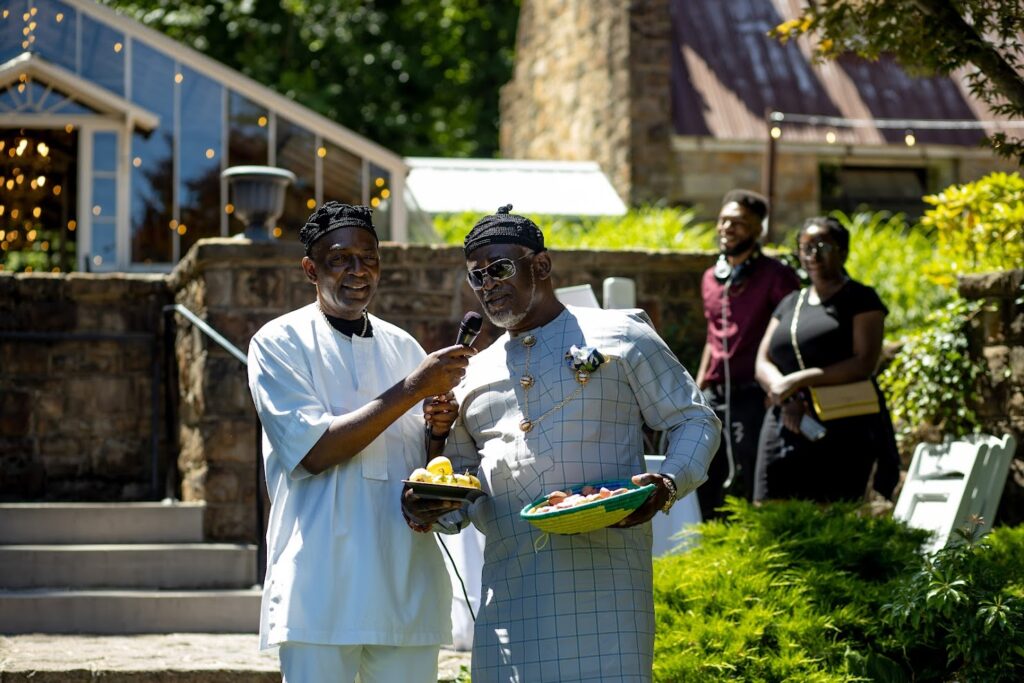
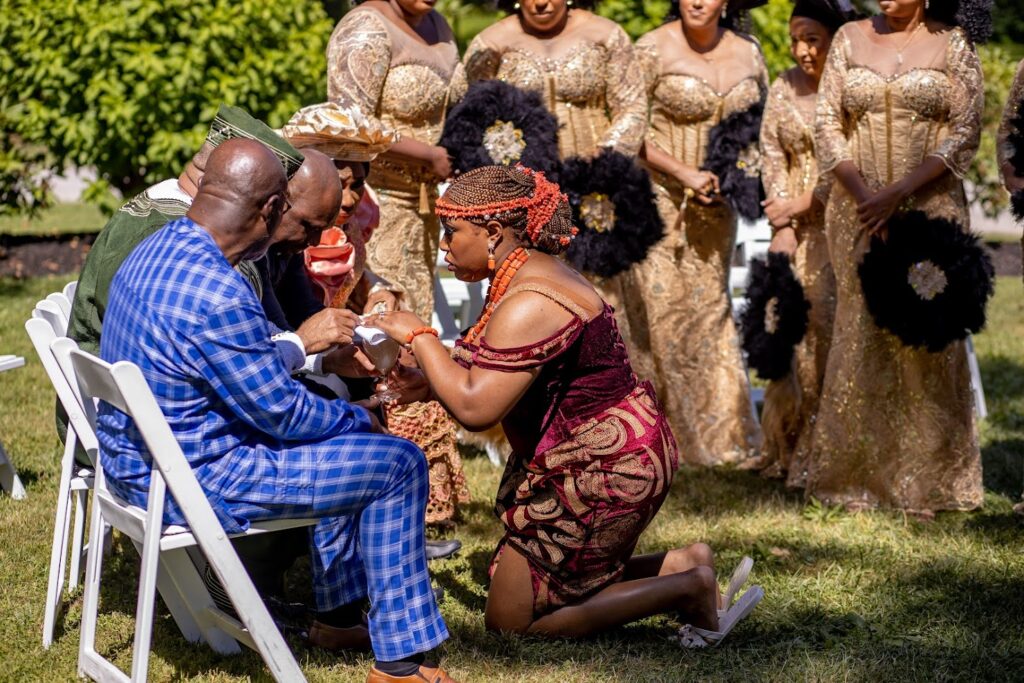
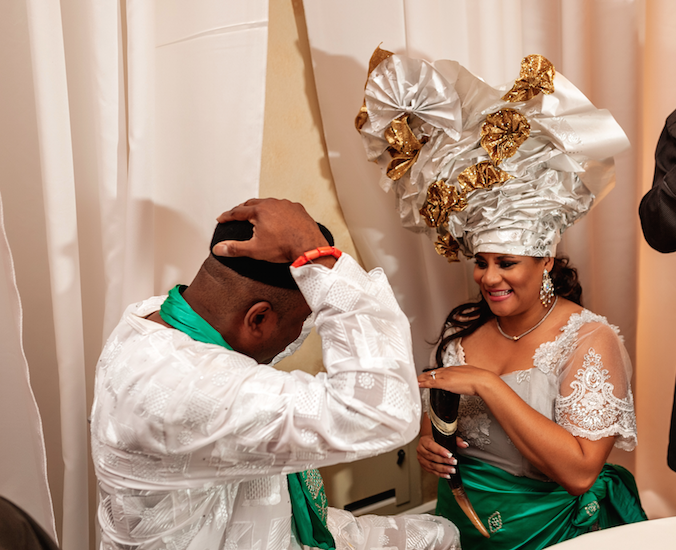
There are three key components within the Nigerian Igbo Engagement Ceremonies.
The Wine Carrying Ceremony: A Sip of Unity and Promise
At the heart of the Nigerian Igbo Engagement Ceremony lies the deeply symbolic Wine Carrying Ceremony. This momentous tradition holds within it the promise of unity and the bride’s symbolic transition to her new family.
Towards the end of the ceremony, and while the bride is not in the venue, the groom is hidden among the guests in anticipation of the bride searching and finding him. Once the bride reenters the venue, she kneels in front of her parents and her father presents her with palm wine in a cup which she holds as she searches for her groom inside of the venue.
With her cup in hand, she dances in between guests, searching for her groom amidst distractions from guests. Once she finds her groom, she kneels in front of him, drinks some of the palm wine and then offers him the remaining drink. The groom drinks all of the palm wine that is remaining in the cup and adds money into the cup. The bride then takes her groom to her father for blessings and prayer. Kneeling before him, they receive blessings and prayers, officially sealing their marriage.
The Dowry: A Treasured Exchange of Blessings
One of the Igbo wedding traditions lies the poignant and intricate tradition of the Dowry, a revered custom that transcends mere material exchange. Rooted in the belief of unity and mutual respect, the Dowry serves as a tangible representation of the groom’s commitment to the bride and his willingness to support her throughout their shared life. As the groom’s family presents a carefully curated array of gifts, it symbolizes not only their affection for the bride but also their desire to contribute to her well-being and happiness. The Dowry is not a transaction, but rather an emotional bond woven between families, fostering a spirit of togetherness and cooperation. It is an acknowledgment of the bride’s intrinsic worth and a testament to the shared values and blessings that both families bring to the union. This sacred exchange, enveloped in traditions passed down through generations, stands as a testament to the enduring significance of family bonds and the timeless unity that forms the foundation of Nigerian Igbo Engagement Ceremonies.
Presentation of the Kola Nut: Symbolic Unity and Shared Blessings
An important part of Igbo weddings is the Presentation of the Kola Nut which is a revered tradition that embraces the spirit of hospitality. Guided by the hands of the eldest family member, the kola nut is ceremoniously cracked open, filling the air with its distinct aroma and the weight of ancestral blessings. As each piece is shared among the attendees, a profound sense of camaraderie takes root, mirroring the interconnectedness of families and the extended community. This cherished ritual not only pays homage to ancestral wisdom but also extends a heartfelt welcome to all, encapsulating the vibrant spirit of Igbo culture in a single, meaningful act.
Attire in Igbo Wedding Traditions
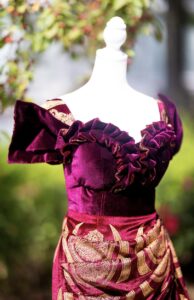
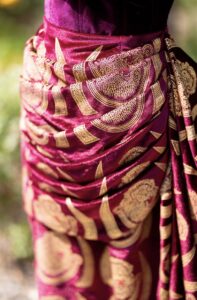
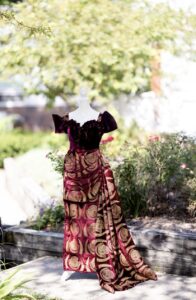
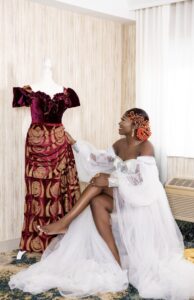
The attire worn during Igbo Weddings is a vibrant tapestry that weaves together the threads of culture, aesthetics, and symbolism.
Isi Agu Fabric
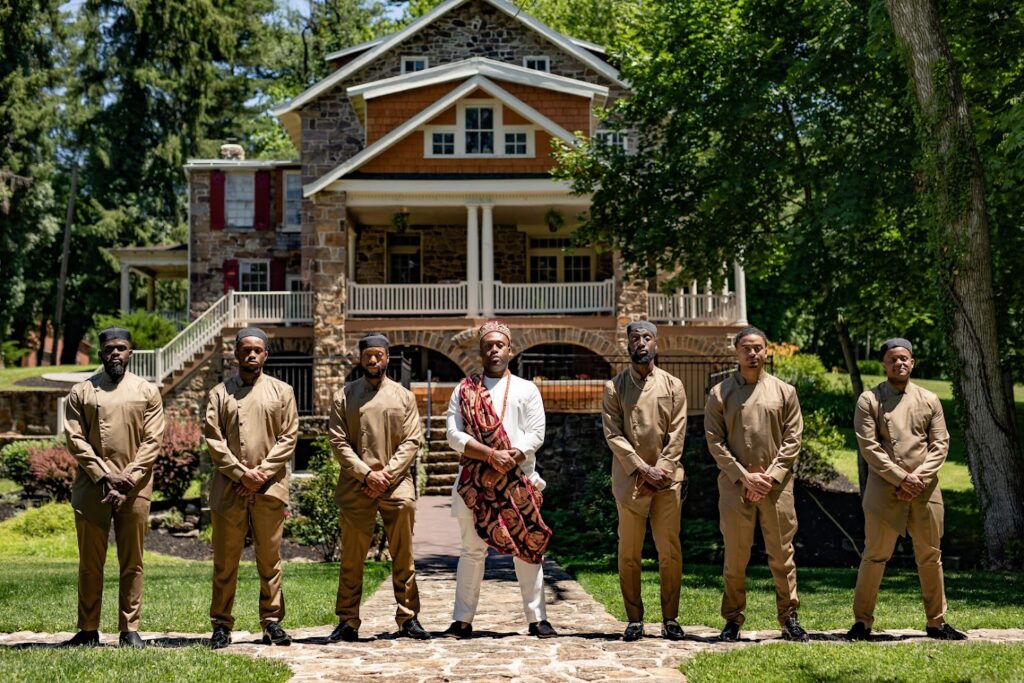
At the heart of Igbo wedding attire is the Isi Agu fabric. Adorned with distinctive lion head motifs, Isi Agu fabric embodies the essence of courage, strength, and resilience. This fabric signifies not only the bride and grooms personal attributes but also the collective spirit of the Igbo people. As the bride and groom wears Isi Agu, they become a living embodiment of the valor and fortitude that have defined generations, bridging the past with the promise of the future.
The Grooms Cane
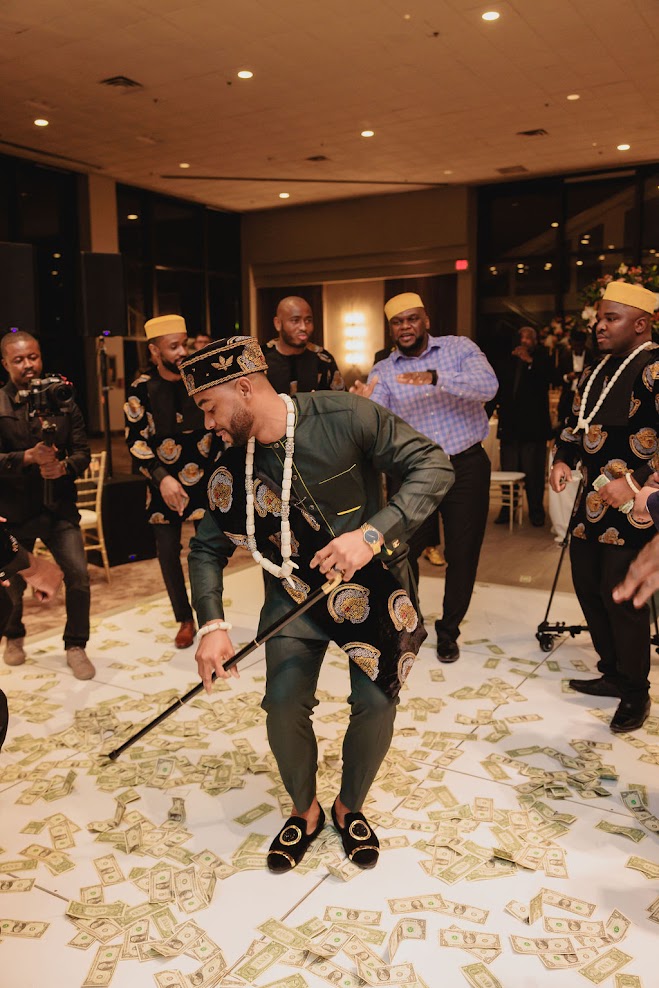
The groom’s cane holds significance for Igbo traditional weddings. This accessory goes beyond being a mere embellishment, symbolizing the groom’s transition from bachelorhood to married life. Elaborately designed and often showcasing intricate craftsmanship like cultural motifs and personal touches, the cane reflects the groom’s heritage and individual style. Throughout various key moments of the wedding, including his entrance and the wine carrying ceremony, the groom proudly carries this cane.
Coral Beads
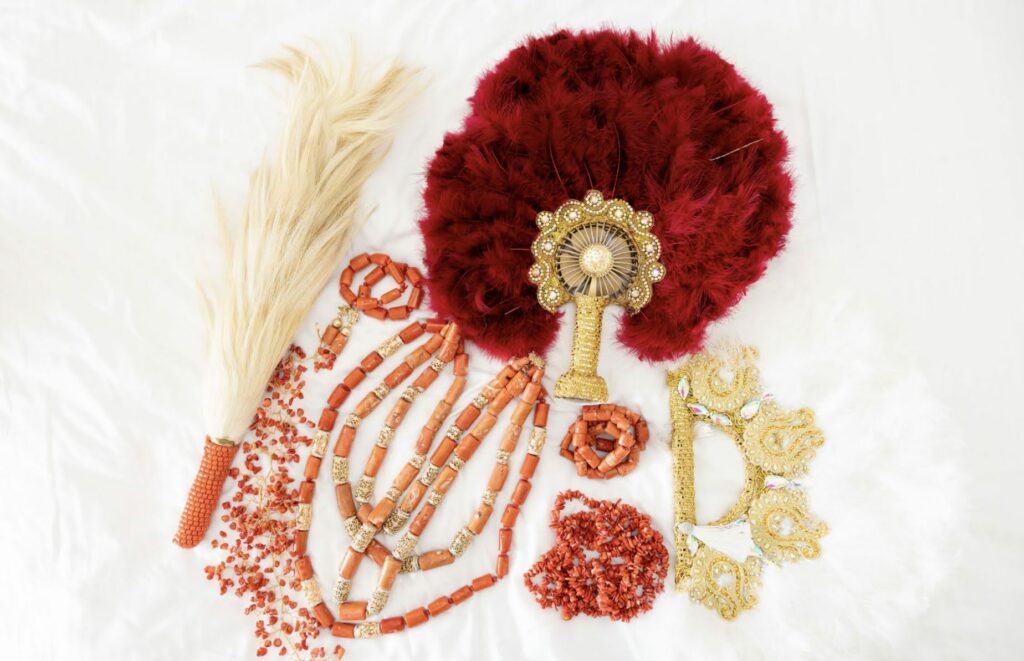
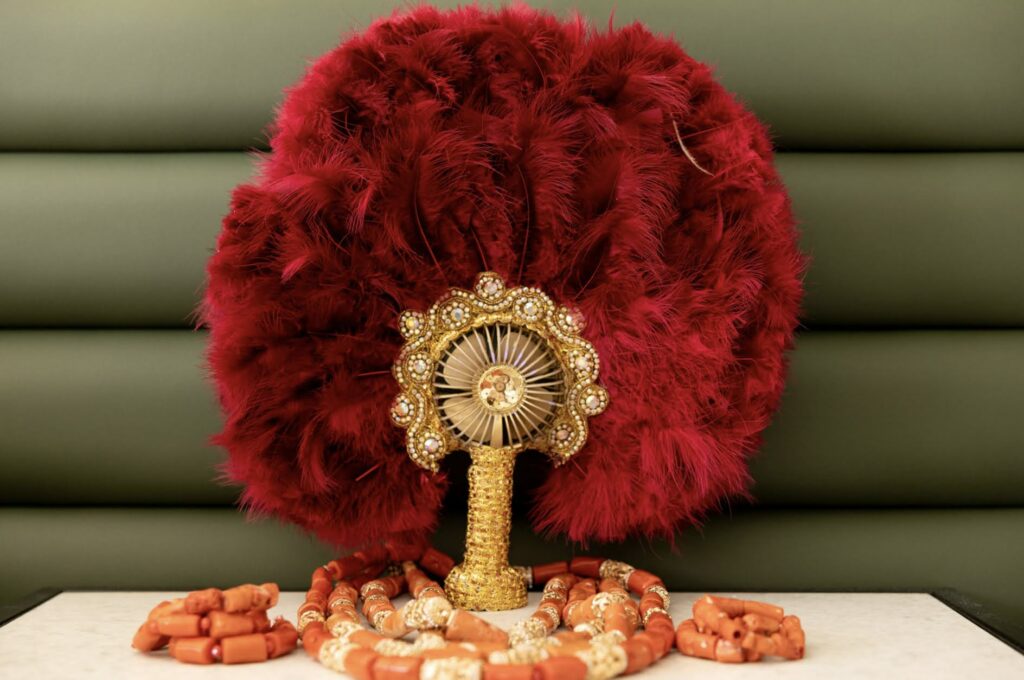
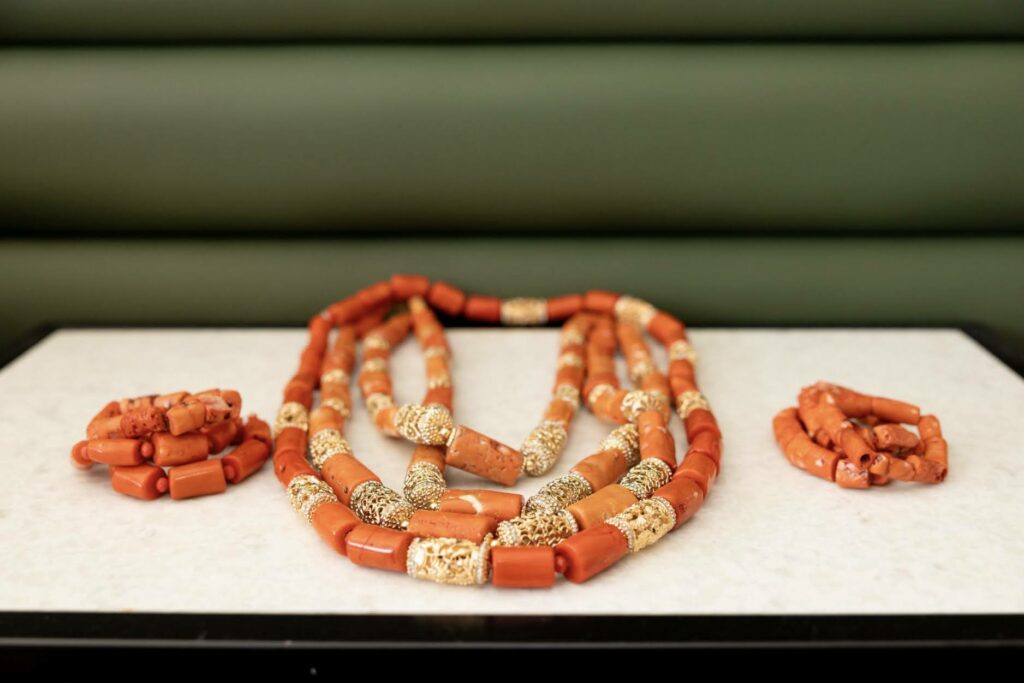
Coral beads bestow an air of regality upon the bride and groom. Adorning the bride’s hair and delicately encircling their necks, these beads are more than mere embellishments; they are symbols of royalty and marital bliss. Like a crown worn by an ancient monarch, coral beads bestow an aura of grandeur upon the couple, evoking a sense of timeless nobility that echoes the regal heritage of the Igbo people.
Gele
If the bride does not choose to wear coral beads in her hair, she can wear a Gele. Intricately tied and meticulously arranged, the Gele is more than a headwrap; it is a statement of grace and sophistication. Each fold, each curve, and each knot tell a story—a story of beauty, strength, and the intricate artistry that weaves together the fabric of life.
Aso-Ebi
The celebration extends beyond the couple, inviting guests to become an integral part of the visual spectacle through Aso-Ebi. This coordinated ensemble of fabrics unites expressing a shared identity and a collective sense of belonging. Aso-Ebi transforms attendees into living brushstrokes, contributing to a larger masterpiece that paints the event with vibrant hues of togetherness and harmony.
In the realm of Igbo Wedding Traditions, attire is more than mere garments; it is a living ode to a culture’s past, a celebration of its present, and a promise of its enduring future. Isi Agu speaks of courage, coral beads sing of royalty, Gele dances with elegance, and Aso-Ebi weaves threads of unity. Together, they create an ensemble that harmoniously blends tradition and modernity, heritage and innovation, and above all, love and unity. As the bride and groom stand adorned in these symbolic garments, they stand not only as individuals but as embodiments of a cultural legacy, ready to embark on a new chapter while proudly carrying the legacy of their ancestors in every elegant fold and bead.
Typical Cuisine Offerings
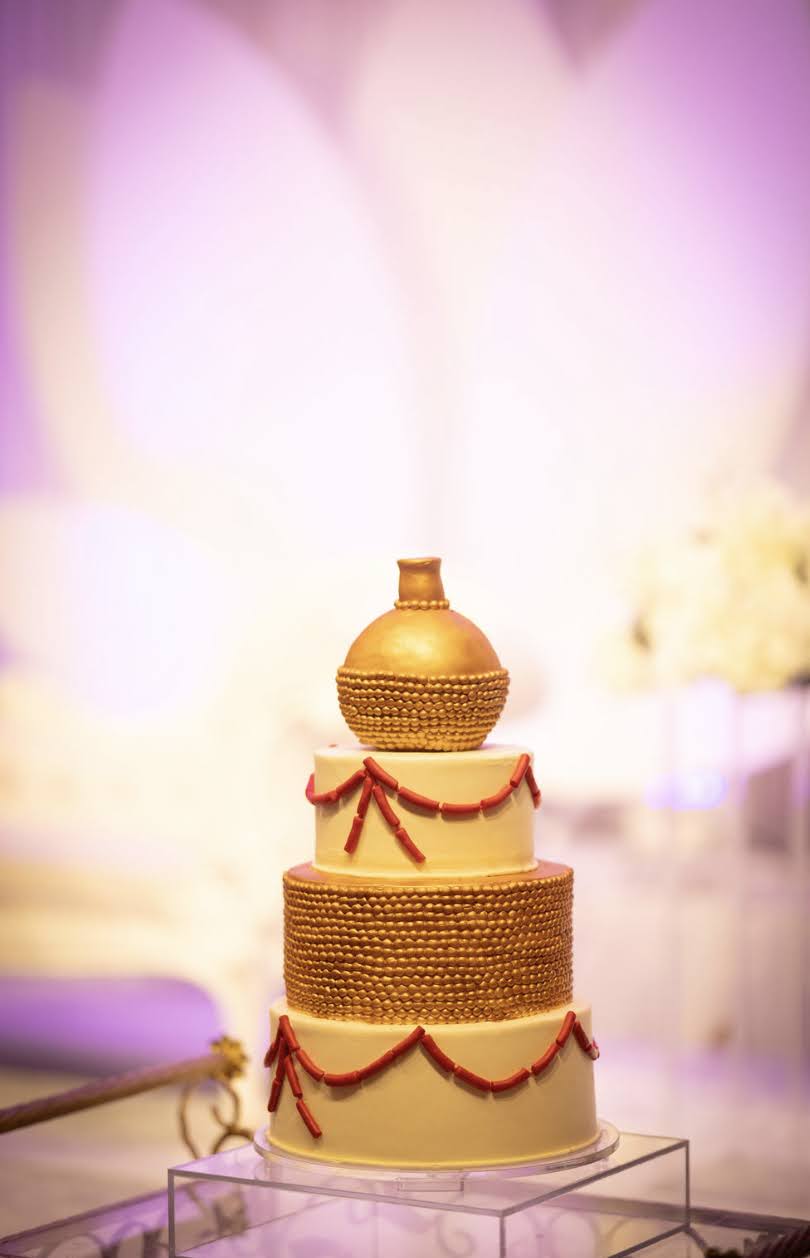
Nigerian weddings are renowned for their great food.
For small chops, you will normally see the following
- Beef or chicken suya
- Meat pie
- Puff puff
- Fish roll
- Scotch egg
- Asun
- Gizdodo
Small chops are served before and during the traditional wedding. You can also bring out the small chops towards the end of the reception as a late night snack for guests.
For dinner, many couples decide to have a buffet dinner to give guests more options and the ability for seconds. Here is a list of food you will likely see:
- Jollof rice
- Fried rice
- Stewed fish, chicken, turkey and/or goat meat
- Dodo (sweet plantain)
- Moi moi
- Salad (Nigerian salad or cesar salad)
- Pounded yam with efo riro and egusi
- Asaro (yam porridge)
For more formal weddings, some of our couples choose to have a plated meal. In this case, 2-3 meal options are provided to guests to select as part of their RSVP. For plated meals, we recommend no more than 5 items on a plate. Here are a couple of curated plated Nigerian options:
- Jollof rice, fried rice, goat meat, moi moi and plantain
- Jollof rice, stewed fish, stewed goat meat, moi moi and plantain
- Pounded yam, efo riro, stewed fish and stewed goat meat
What Gift Should I Bring to a Nigerian Igbo Wedding?
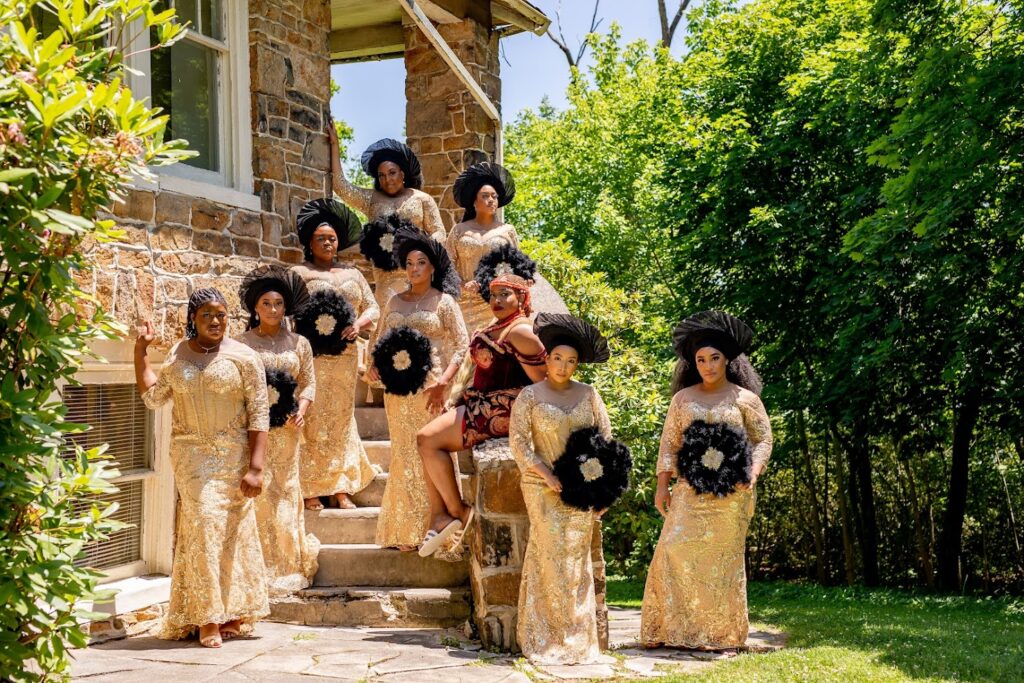
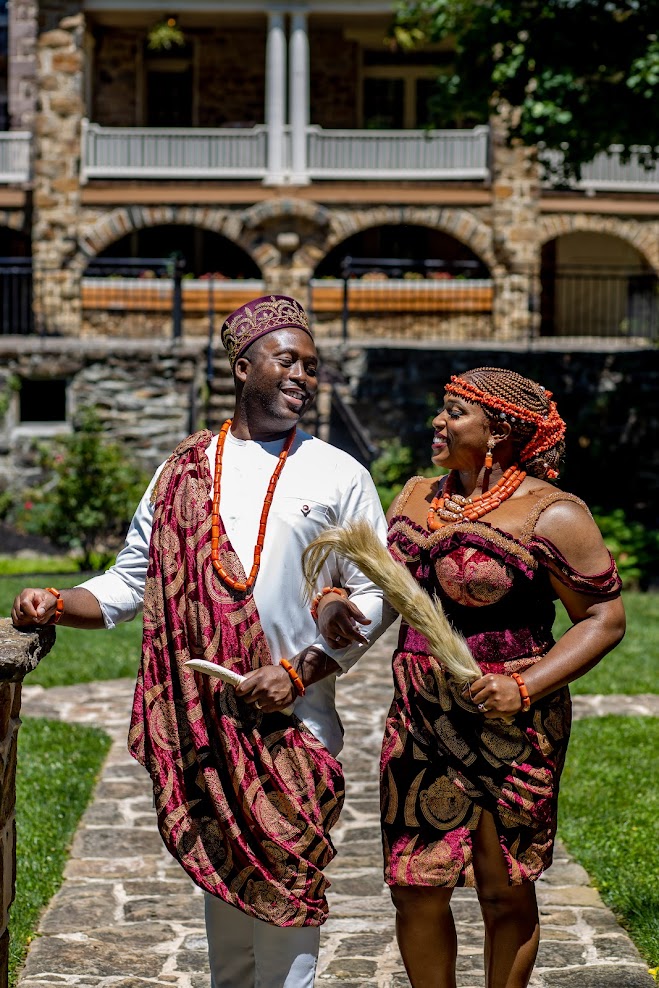
While there is no strict gift-giving tradition, it is customary to give monetary gifts to the couple by “spraying” them. The spraying tradition involves guests showering the couple with money during dances and celebrations. The amount is entirely at the guest’s discretion, and the gifts are seen as a gesture of goodwill and support for the newlyweds.
The Key Differences in a Traditional Igbo Engagement Ceremony and a Western Wedding
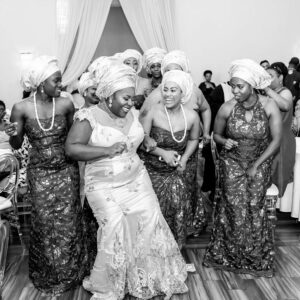
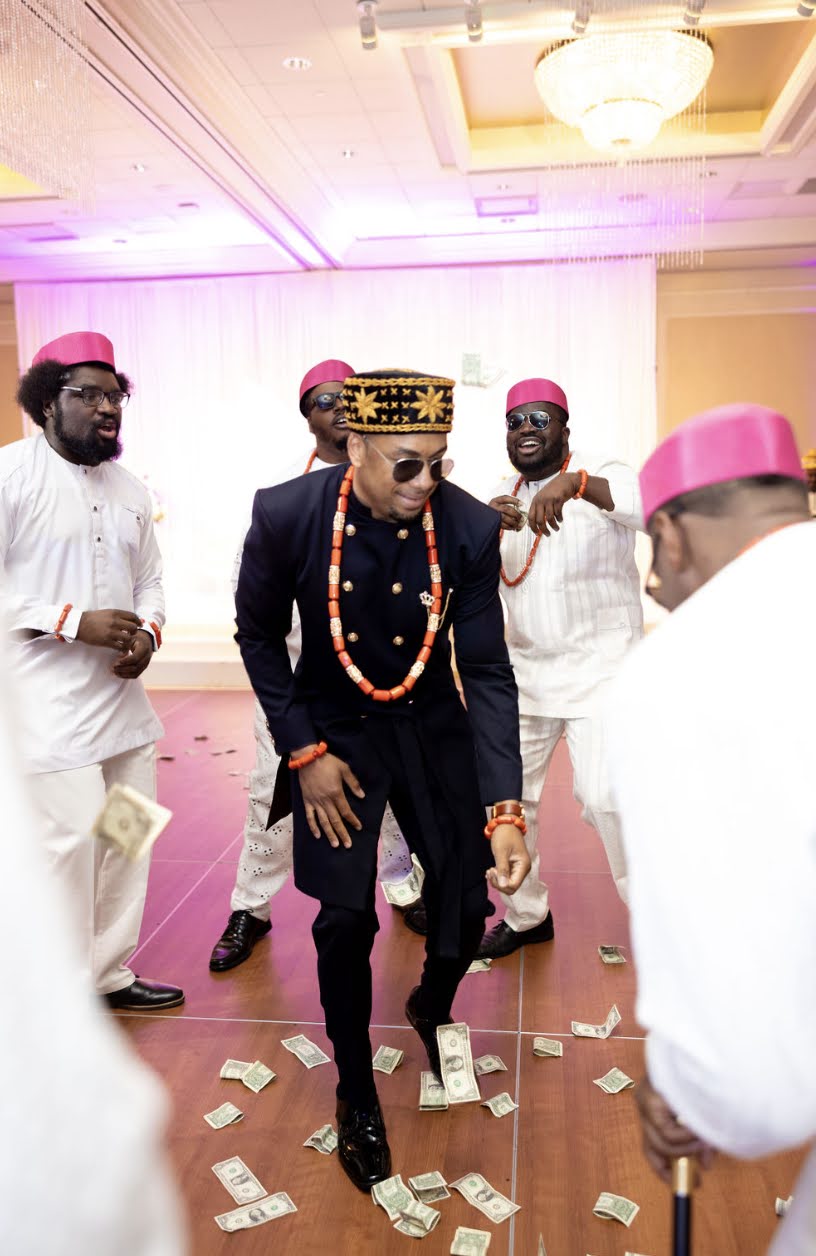
Nigerian Igbo weddings are distinct from Western weddings in several ways:
- Attire: The bride and groom usually wear traditional Igbo attire made from the fabric “isiagu”.. Guests also often wear complimentary traditional outfits.
- Guest Involvement: Nigerian weddings are known for their inclusivity and community involvement. Guests actively participate in dances and shower the couple with money in a tradition called “spraying.”
- The Dowry: The dowry involves gifts and money provided from the groom’s family to the bride’s family. Items include food (yams, palm wine, fruit, salt and candy) and physical goods like luggage and cookware.
- Bride and Groom Dancing in with Their Friends (Separately): For their entrances, the bride and groom dance with their friends separately into the venue. Many times, the bride and her ladies will have a dance routine to entertain the crown and the groom that awaits.
Etiquette and Cultural Sensitivity: Navigating an Igbo Wedding with Respect
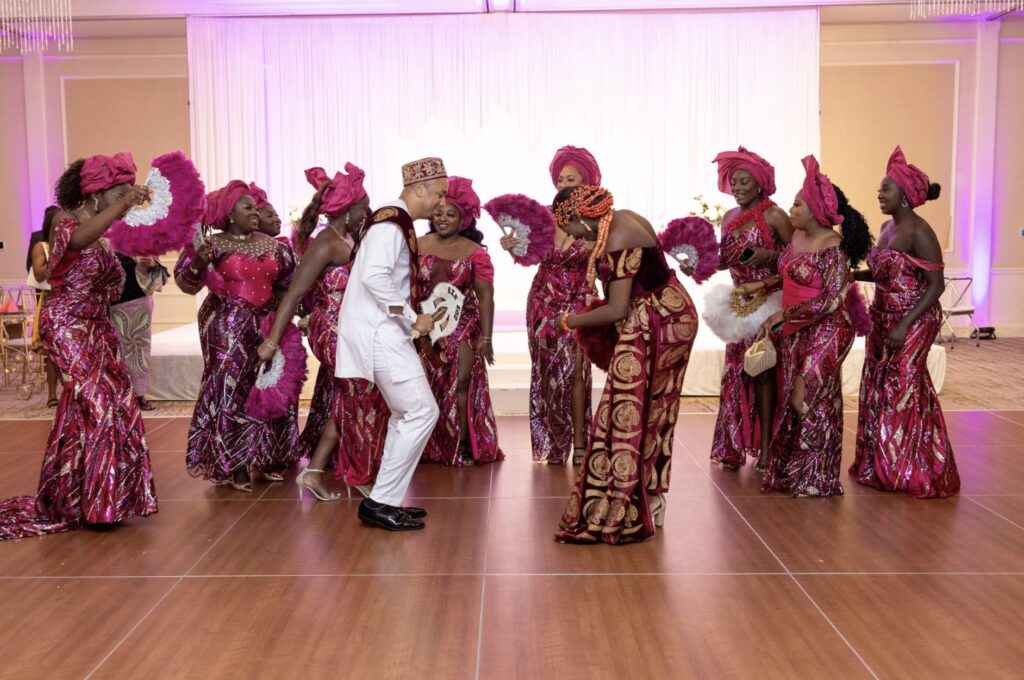
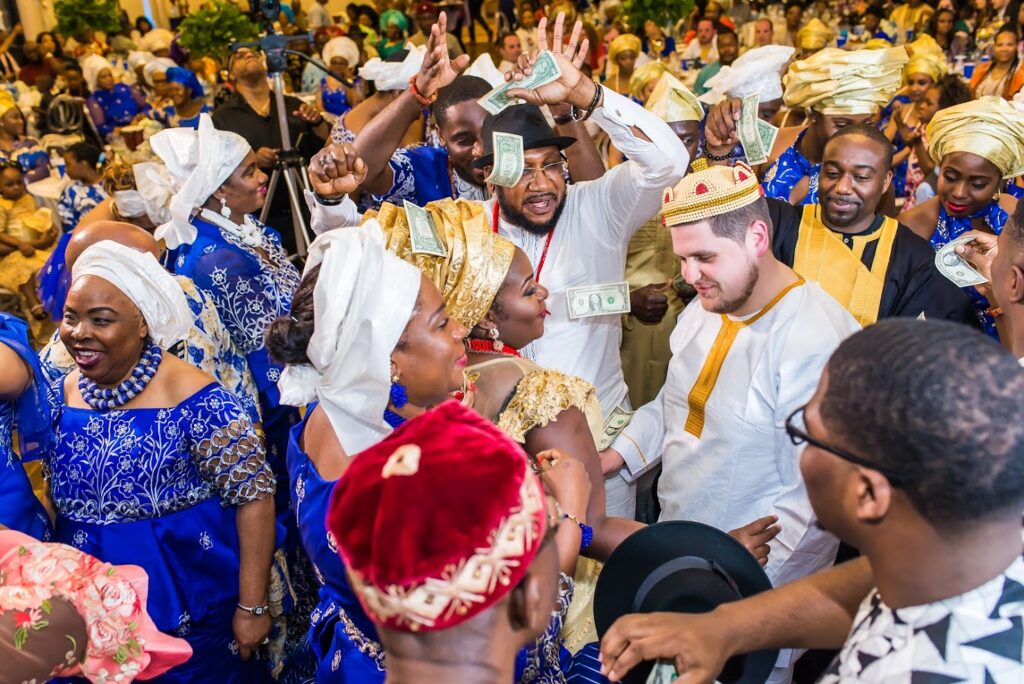
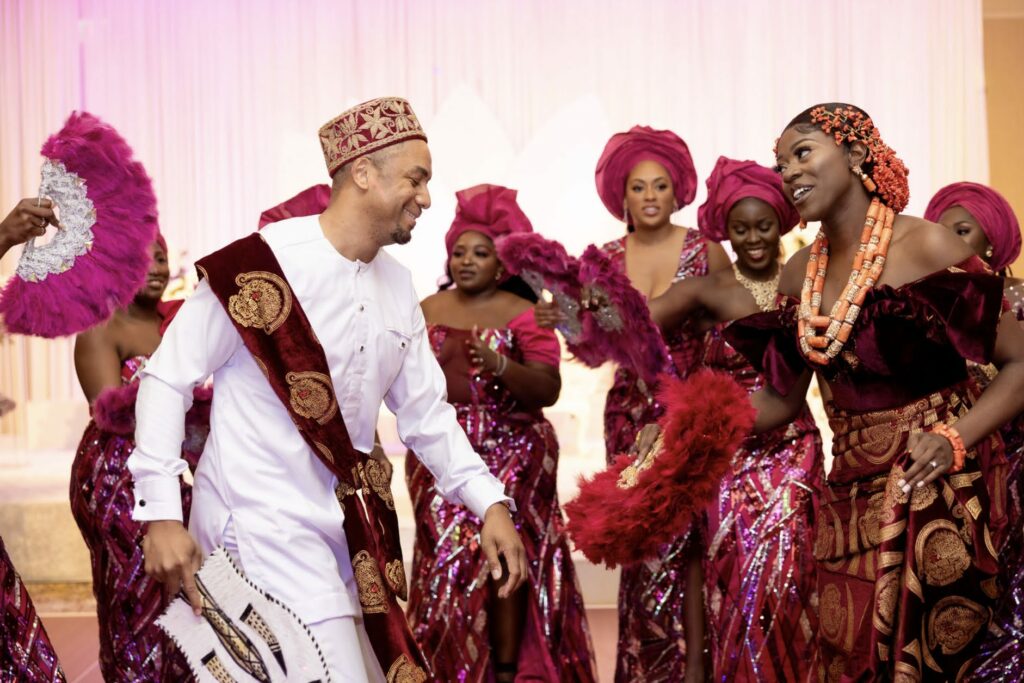
To ensure your presence as a guest is a positive and respectful contribution, here are some important considerations:
- Respect Traditional Practices: Igbo weddings are steeped in tradition and symbolism. Respect the customs and practices, and avoid any actions that could be seen as disrespectful or inappropriate. For example, eating the kola nut and spitting it out in front of everyone. Show sensitivity to the significance of the rituals.
- Money Spraying Etiquette: During the money spraying tradition, refrain from picking up money that has fallen on the floor and re-spraying the couple.
- Understanding Time: It’s a cultural norm for some Igbo weddings to start later than scheduled, particularly if there isn’t a wedding planner. While this might be different from what you’re used to, embrace the experience and be patient. The vibrant celebration that awaits is well worth the wait.
- Respect Elders and Titles: Igbo culture places great importance on respecting elders and acknowledging titles. Greet elders with deference and use appropriate titles when addressing them. This gesture is a sign of respect and appreciation for their wisdom and contributions.
- Avoid Uninvited Guests: Igbo weddings are meticulously planned, and the guest list is thoughtfully curated. Respect the couple’s wishes and avoid bringing uninvited guests, as this can disrupt the seating arrangements and overall flow of the event.
Nigerian Wedding Traditions for Igbo Weddings are a jubilant fusion of cultural heritage and modern celebration. From the exquisite attire that tells stories of heritage to the pivotal role of the MC and the cherished wine carrying ceremony and dowry traditions, every facet of these weddings is an ode to love, unity, and tradition. As we’ve journeyed through the vibrant customs that define Nigerian Igbo Engagement Ceremonies, we invite you to immerse yourself in the rich cultural tapestry, where each moment is a symphony of shared values and profound connections.
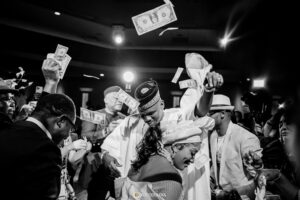
If you’re planning your Nigerian wedding and want to know some of our secrets on how to ensure your guests are not late for your wedding, read this article next: How to Avoid Late Guests For Your Nigerian Wedding
